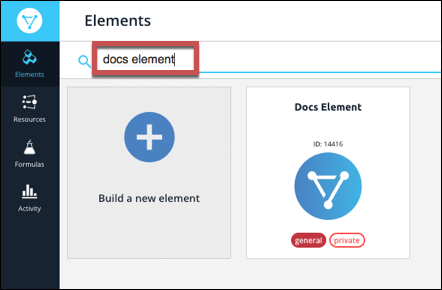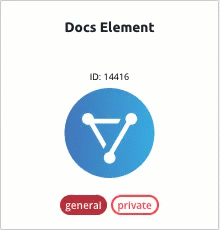Authenticate with Marketo
You can authenticate with Marketo to create your own instance of the Marketo element through the UI or through APIs. Once authenticated, you can use the element instance to access the different functionality offered by the Marketo platform.
Authenticate Through the UI
Use the UI to authenticate with Marketo and create an element instance. Marketo authentication follows an OAuth 2 framework and you will need to sign in to Marketo as part of the process.
If you are configuring events, see the Events section.
To authenticate an element instance:
- Sign in to Cloud Elements, and then search for Marketo in our Elements Catalog.

- Hover over the element card, and then click Authenticate.

- Enter a name for the element instance.
Enter the following pieces of information:
- Client Id
- Client Secret
- Identity URL
- REST URL
Click Create Instance.
After successfully authenticating, we give you several options for next steps. Make requests using the API docs associated with the instance, map the instance to a virtual data resource, or use it in a formula template.
Authenticate Through API
Use the /instances endpoint to authenticate with Marketo and create an element instance. If you are configuring events, see the Events section.
To create an element instance:
Construct a JSON body as shown below (see Parameters):
{ "element": { "key": "marketo" }, "providerData": { "code": "" }, "configuration": { "oauth.api.key": "<<client_id>>", "oauth.api.secret": "<<client_secret>>", "marketo.identity.url": "<<marketo_identity_url", "base.url": "<<marketo_rest_url>>" }, "tags": [ "<<TAG_NAME>>", "<<TAG_NAME>>" ], "name": "<<INSERT INSTANCE NAME>>" }Call the following, including the JSON body you constructed in the previous step:
POST /instancesNote: Make sure that you include the User and Organization keys in the header. See the Overview for details.Locate the
tokenandidin the response and save them for all future requests using the element instance.
Example cURL
curl -X POST \
-H 'Authorization: User <INSERT>, Organization <INSERT>' \
-H 'Content-Type: application/json' \
--data '{ \
"name": "My Instance", \
"providerData": { \
"code": "" \
}, \
"configuration": { \
"filter.response.nulls": "true", \
"oauth.api.key": "<INSERt>", \
"oauth.api.secret": "<INSERT", \
"marketo.identity.url": "<INSERT>", \
"base.url": "<INSERT>" \
} \
}'
Parameters
API parameters not shown in Cloud Elements are in code formatting.
| Parameter | Description | Data Type |
|---|---|---|
| 'key' | The element key. marketo |
string |
Namename |
The name for the element instance created during authentication. | string |
marketo.identity.url |
The Identity URL from Marketo. This is the Identity URL that you noted at the end of the Endpoint Setup section. | |
oauth.api.key |
The API Key from Marketo. This is the API Key that you noted at the end of the Endpoint Setup section | string |
oauth.api.secret |
The Consumer Secret from Marketo. This is the Consumer Secret that you noted at the end of the Endpoint Setup section | string |
base.url |
The Marketo REST URL. This is the REST URL that you noted at the end of the Endpoint Setup section | string |
Filter null values from the response filter.response.nulls |
Optional. Determines if null values in the response JSON should be filtered from the response. Yes or true indicates that Cloud Elements will filter null values. Default: true. |
boolean |
| tags | Optional. User-defined tags to further identify the instance. | string |
Example Response
{
"id": 427164,
"name": "My Instance",
"createdDate": "2017-06-06T18:00:26Z",
"token": "<<token value>>",
"element": {
"id": 85,
"name": "Marketo",
"hookName": "Marketo",
"key": "marketo",
"description": "Add a Marketo Instance to connect your existing Marketo account to the Marketing Hub, allowing you to manage accounts, campaigns, contacts, leads etc. across multiple Marketing Elements. You will need your Marketo account information to add an instance.",
"image": "elements/provider_marketo.png",
"active": true,
"deleted": false,
"typeOauth": true,
"trialAccount": false,
"configDescription": "If you do not have an Marketo account, you can create one at <a href=\"//http://pages2.marketo.com/freetrial.html\"\n target=\"_blank\">Marketo Signup</a>",
"resources":[],
"transformationsEnabled": true,
"bulkDownloadEnabled": true,
"bulkUploadEnabled": true,
"cloneable": true,
"extendable": true,
"beta": false,
"authentication": {
"type": "oauth2"
},
"extended": false,
"hub": "marketing",
"protocolType": "http",
"parameters": [],
"private": false
},
"elementId": 85,
"provisionInteractions": [],
"valid": true,
"disabled": false,
"maxCacheSize": 0,
"cacheTimeToLive": 0,
"configuration": {
"event.notification.subscription.id": null,
"oauth.api.secret": "qePHp0mBzTE693mJg20ls2CNhSi0Bbmm",
"base.url": "https://338-ZRW-745.mktorest.com/rest",
"marketo.identity.url": "https://338-ZRW-745.mktorest.com/identity",
"event.vendor.type": "polling",
"event.helper.key": "marketoPolling",
"oauth.user.token": "25607056-f75d-42b5-a58a-cef2f016ad36:ab",
"filter.response.nulls": "true",
"event.poller.refresh_interval": "15",
"event.notification.callback.url": null,
"event.notification.signature.key": null,
"event.poller.urls": "leads",
"oauth.user.refresh_interval": "3381",
"oauth.api.key": "451a529b-8f0f-404a-93b7-b5adb7a01ef1",
"oauth.user.refresh_time": "1496772027604"
},
"eventsEnabled": false,
"traceLoggingEnabled": false,
"cachingEnabled": false,
"externalAuthentication": "none",
"user": {
"id": 123456
}
}